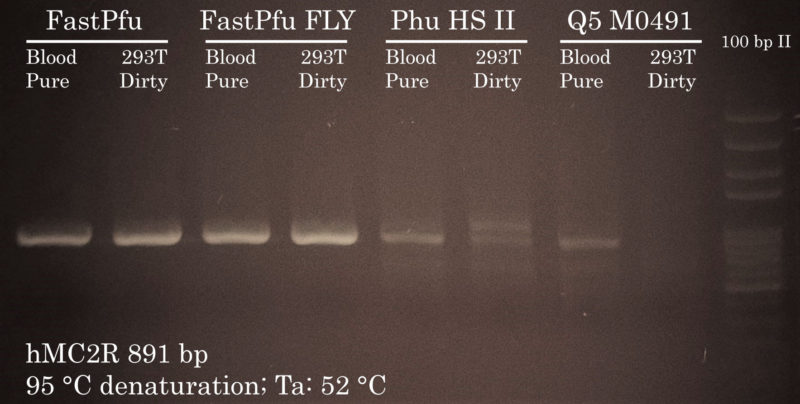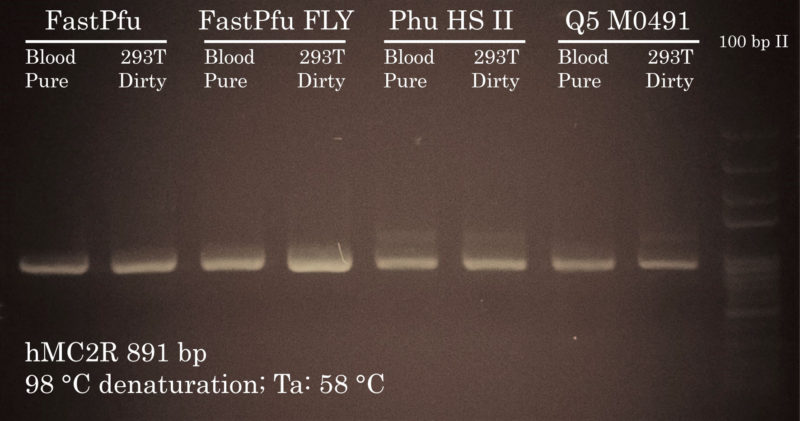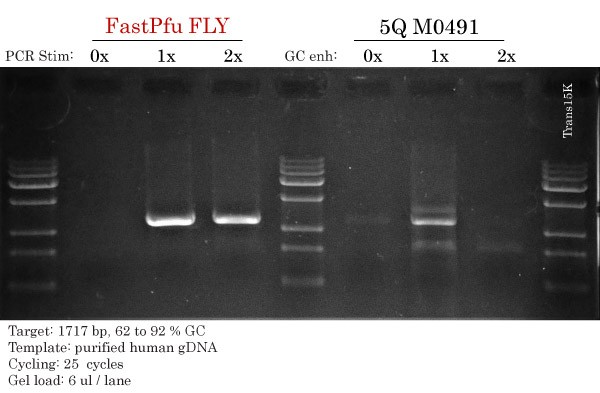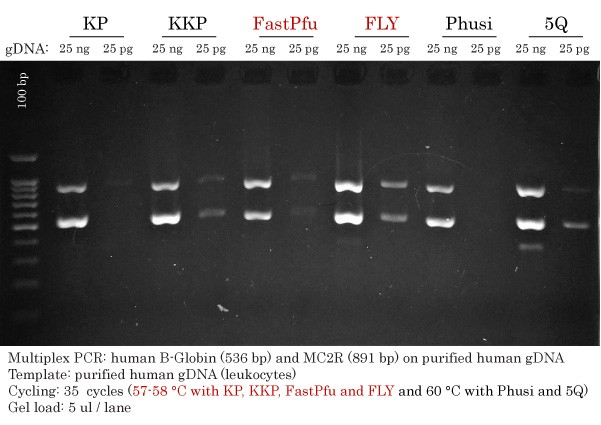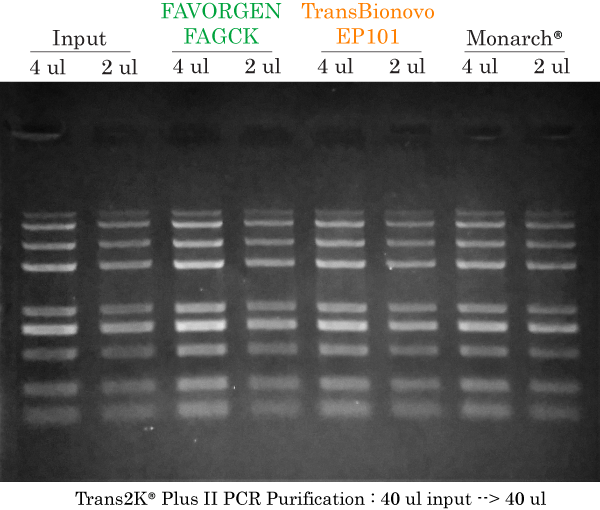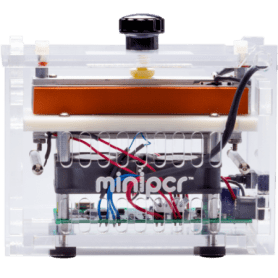Optimal PCR Cycling for High-Fidelity DNA Polymerases
Comparison of FastPfu and FastPfu FLY with other High-Fidelity DNA PolymerasesPCR Cycling comparison between TransBionovo’s TransStart® FastPfu and FastPfu FLY with competitor High-Fidelity DNA Polymerases.
Finding a reliable and versatile high-fidelity enzyme remains a challenge in DNA research. Our goal was to extend the data presented in our previous comparison using Transgen Biotech’s high-fidelity DNA Polymerases. TransStart® FastPfu and TransStart® FastPfu FLY were compared to industry-leading polymerases from competitor companies (Phusion® HotStart II from ThermoFisher Scientific and Q5® high-fidelity DNA Polymerase from New England Biolabs). Is PCR Cycling difficult to optimize?
In this post, ,regardless of PCR Cycling conditions used, we demonstrate the incredible permissivity and specificity of TransStart® FastPfu and TransStart® FastPfu FLY DNA polymerases on performing PCR amplification from pure human gDNA or ”quick ‘n dirty” 293T cell lysate as template.
PCR reaction setup
Genomic DNA samples were given to us by researchers in Montreal. The purified human blood gDNA was described in PCR Success Story #8 and the 293T ”quick ‘n dirty” gDNA sample was from a researcher at the Montreal Neurological Institute.
20 ul reactions were setup on ice as follows:
- ddH2O up to 20 ul
- 5x buffer (respective buffers): 4 ul
- 0.2 mM dNTPs
- 0.2 uM hMC2R forward primer / 0.5 uM hMC2R forward primer (for Phusion/Q5)
- 0.2 uM hMC2R reverse primer / 0.5 uM hMC2R reverse primer (for Phusion/Q5)
- Roughly 20 ng gDNA (2 ul of diluted gDNA)
- 1 u of FastPfu or FastPfu FLY / 0.4 u of Phusion or Q5
PCR Cycling Protocols
Transgen PCR Cycling
Initial denaturation: 95 °C for 120 s
30 cycles
- Denaturation: 95 °C for 15s
- Annealing: 52 °C for 20 s
- Extension: 72 °C for 15 s
Final extension : 72 °C for 120 s
Phusion/Q5 PCR Cycling
Initial denaturation: 98 °C for 30 s
30 cycles
- Denaturation: 98 °C for 10s
- Annealing: 58 °C for 20 s
- Extension: 72 °C for 15 s
Final extension : 72 °C for 120 s
FastPfu and FastPfu FLY are better High-Fidelity DNA Polymerases
Using the Transgen PCR Cycling protocol, FastPfu and FastPfu FLY perfectly amplified full-lenght human MC2R from both pure and dirty gDNA samples whereas Phusion® and Q5® failed to do so specifically.
Using the Phusion/Q5 PCR Cycling protocol, FastPfu and FastPfu FLY perfectly amplified full-lenght human MC2R from both pure and dirty gDNA samples. Phusion® and Q5® also amplified MC2R more efficiently and specifically than with using the Transgen PCR Cycling protocol. However, a small amount of non-specific amplification is observable.
Regardless of the PCR cycling protocol, FastPfu and FastPfu FLY offer a6°C annealing temperature (Ta) window for perfect DNA maplification by PCR.
Why troubleshoot your PCR reactions when you can choose permissive DNA polymerases such as TransGen Biotech’s FastPfu and FastPfu FLY?!
DNA polymerase specifications:
1- TransStart FastPfu (AP221):
- >50x fidelity of EasyTaq
- Amplification speed between 2 and 4 kb/min
2- TransStart FastPfu FLY (AP231):
- >100x fidelity of EasyTaq
- Amplification speed between 2 and 6 kb/min
3- Phusion® HotStart II (NEB: M0491):
- >50x fidelity of Taq
- Amplification speed between 2 and 4 kb/min
4- Q5® high-fidelity DNA Polymerase:
- >100x fidelity of Taq
- Amplification speed between 2 and 6 kb/min
Phusion® is a trademark of ThermoFisher Scientific.
Q5® is a trademark of Nw England Biolabs.
DNA polymerase PCR setup and cycling according to respective datasheets:
1- TransStart FastPfu (AP221):
Initial denaturation: 2 min at 95 °C
35 cycles:
- Denaturation: 95 °C for 30s
- Annealing: Tm -5 °C for 30 s
- Extension: 72 °C at 2-4 kb/min
Final extension : 72 °C for 5 min
2- TransStart FastPfu FLY (AP231):
Initial denaturation: 2 min at 95 °C
35 cycles
- Denaturation: 95 °C for 30s
- Annealing: Tm -5 °C for 30 s
- Extension: 72 °C at 2-6 kb/min
Final extension : 72 °C for 5 min
3- Phusion HotStart II high-fidelity DNA Polymerase:
Initial denaturation: 30s at 98 °C
35 cycles
- Denaturation: 98 °C for 10s
- Annealing: Tm +3 °C for 10-30 s
- Extension: 72 °C at 1.5 to 2 kb/min
Final extension : 72 °C for 2 min
4- Q5 high-fidelity DNA Polymerase:
Initial denaturation: 30s at 98 °C
35 cycles
- Denaturation: 98 °C for 10s
- Annealing: Tm +3 °C for 10-30 s
- Extension: 72 °C at 2 to 3 kb/min
Final extension : 72 °C for 2 min

